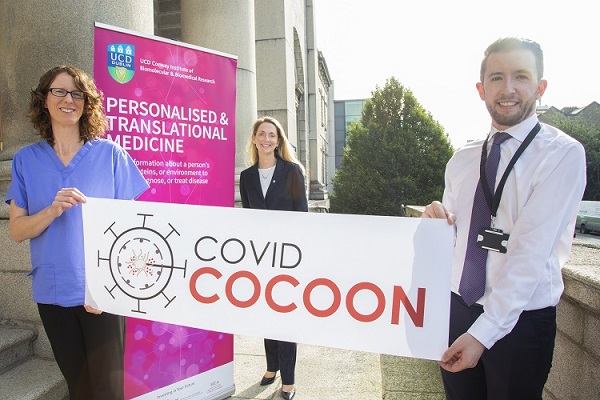Unravelling clues to blood clots in COVID-19
As we learn more about COVID-19, we are seeing that it appears to lead to extensive blood clotting in patients who become severely ill with the disease. This has led to researchers exploring the role of anticoagulants (blood-thinning medicines) in COVID-19. Figuring out the extent of blood clotting dysregulation and the optimal treatment approach would be of enormous clinical benefit.
Science Foundation Ireland (SFI) is funding the COCOON study at University College Dublin to develop a deeper understanding of the mechanisms underlying abnormal blood clotting in COVID-19. The project will also look for signals or biomarkers in patients that can warn of a high risk of clotting problems in COVID-19, and explore how existing blood clotting treatments could be optimised, particularly in severe disease.
The COCOON study is led by Dr Barry Kevane, Consultant Haematologist at the Mater Misericordiae University Hospital and UCD with Conway Fellows, Professor Fionnuala Ní Áinle and Professor Patricia Maguire in the UCD Conway SPHERE research group.

Pictured (l-r) Professor Fionnuala Ni Ainle, Professor Patricia Maguire and Dr Barry Kevane
What is the issue?
Patients with severe COVID-19 often have problems with their blood forming too many clots, which could be a major contributor to morbidity and mortality.
What will the research do?
UCD Conway SPHERE researchers will analyse patient blood samples during the course of COVID-19 and use technologies such as Artificial Intelligence to search for early warning signals that blood clotting is going out of control. The project will also explore the interplay between the immune system and blood clotting in COVID-19.
What will the impact be?
By understanding more about when and how blood clotting becomes deregulated in COVID-19, the research will pave the way for better diagnostics and treatments.
Commenting on the project, Dr Barry Kevane says: “Using technologies which have been developed by my colleagues Prof Fionnuala Ní Áinle and Prof Patricia Maguire in the UCD Conway SPHERE research group, we intend to characterise the molecular mechanisms underlying clotting derangements in COVID-19. A deeper understanding of this problem would help inform clinical decisions relating to clot prevention and treatment in this disease and would be of major clinical benefit.”
Minister for Further and Higher Education, Research, Innovation and Science, Simon Harris, TD, has announced an investment of €5.5 million in 41 projects under the SFI led COVID-19 Rapid Response Research and Innovation Programme. The funding focused on supporting projects which respond to the immediate and pressing needs of society arising from the pandemic.
The COCOON study is one of eight UCD projects that received funding under this scheme totalling €1.5 million.
Announcing the awards Minister Harris, said: “It is clear this virus is with us for a significant period of time and yet we still have a lot to learn about it. The 41 projects announced today are part of a national drive to find solutions to the challenges we face now, and to help us prepare to live in a changing environment that requires new thinking and innovative approaches. I would like to congratulate all of the researchers receiving funding today and thank them for their efforts in Ireland’s collective response to COVID-19.”
The COVID-19 Rapid Response Research, Development and Innovation programme was established by SFI, Enterprise Ireland, IDA Ireland, the Health Research Board and Irish Research Council.
Social Media Links